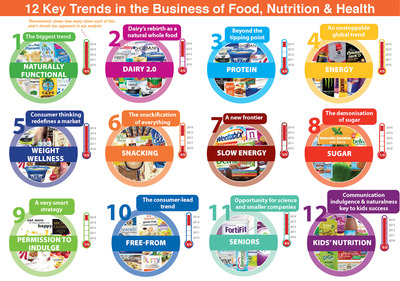Why you shouldn't call your product 'natural'
If you want your product to be successful, don’t refer to it as ‘natural’. This is the advice of food specialist Julian Mellentin, author of 12 Key Trends 2014, which is published by New Nutrition Business.
“If you want to be successful, don’t use the word natural on your product,” Mellentin cautions. “You run the risk of getting bogged down in a regulatory minefield - and there are plenty of other ways of communicating the naturalness of your product without ever using the word natural.”
In the right product formats, Mellentin says, ‘naturally healthy’ ingredients will help give your product a health halo and increase sales - sometimes significantly.
Mellentin points to coconut water and almond milk as prime examples of products that have successfully combined a natural image with convenience - and have taken off. Mellentin predicts that Canadian maple water will be the next big thing - but only if maple water brands get their marketing right.
‘Slow energy’, kids’ nutrition, snacking and protein are just some of the growth opportunities for the food and health market that Mellentin highlights in 12 Key Trends 2014.

“Dairy as a naturally functional whole food, slow energy, weight wellness, healthy snacking and ‘permission to indulge’ all present a wealth of possibilities for food and beverage companies,” said Mellentin.
According to Mellentin, weight management is no longer a special category of foods: consumers think about weight as part of their everyday food choices and as a way of maintaining wellness.
“This is creating winners and losers. Unilever’s and Nestlé’s weight management strategies lie in ruins, because they are based on an understanding of the market that was out of date five years ago,” Mellentin said.
Entrepreneurs who connect to consumers’ desire for an individualised approach based on ‘normal’ foods and who also connect to the most important trends will be most successful, Mellentin predicts.
Products claiming to deliver ‘slow release’ or ‘sustained’ energy have attracted plenty of consumer interest of late. Although many companies think of slow energy and blood glucose control in relation to diabetes, the biggest opportunity for the food and beverage industry lies in providing sustained energy to the mass market, Mellentin says.
However, as this is an early-stage trend, the claims are complex and delivering the right message to consumers is vital. Product developers are turning to slowly digestible carbohydrates such as oats, barley, sorghum and millet. New research is also underscoring dairy’s role in delivering slow energy.
The 12 Key Trends analysis, which has been published every year since 1996, draws on interviews with 450 food and beverage executives worldwide, as well as material from the New Nutrition Business journal. It is claimed to be the only trend analysis that differentiates enduring trends from short-term fads using a methodology that takes into account every factor driving a trend’s evolution.
Two more Italian tomato exporters investigated for dumping
Vegetable producers and processors have welcomed an announcement that the Anti-Dumping Commission...
Global Food Safety Conference to feature LRQA, Cargill, Metro Group and World Bank
Representatives from LRQA, Cargill, Metro Group and the World Bank are among some of the keynote...
Labelling review recommends 'per serving' information be scrapped
The independent review of labelling has issued a recommendation that proposes the declaration in...












